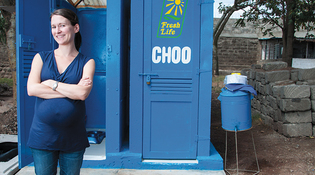 loading
loading
Where They Are NowChanging the world, one toilet at a timeAn alum’s startup company promises better sanitation for the poor.  Courtesy Lindsay Stradley ’03Lindsay Stradley ’03 cofounded Sanergy—a franchise company for clean, well-kept pay toilets in the slums of Nairobi. View full imageAs an American studies major at Yale, Lindsay Stradley ’03 didn’t expect to wind up as cofounder of a company that makes and markets pay toilets in the slums of Nairobi. Sanergy, her sanitation enterprise, has licensed its “Fresh Life” loos to 317 local entrepreneurs who profit by them. The “product” is recycled into energy and fertilizer, rather than polluting local waterways as traditional pit latrines do. Sanergy won the 2014 $100,000 Grinnell Prize for social justice. Y: How long have you lived in Nairobi?S: Since 2011. We founded Sanergy when we were in business school and then moved to Nairobi like a week after we graduated. Y: Who’s “we”?S: My husband [Ani Vallabhaneni] and I, and David Auerbach [’03], who was at Yale with me, and two other founders. Y: How did you and your husband meet?S: We all met up at MIT at business school orientation, hiking in the mountains. We realized that all of us had come for much the same reason—to create or join a social enterprise to figure out how do you use business principles to tackle some of the toughest poverty and social challenges around the world. Y: So not a “Who’s your favorite Beatle?” conversation. How did you come to the goal of social change?S: Much of what I studied [at Yale] was related to poverty, and I was very involved in Dwight Hall. Y: How about after college?S: I joined Teach for America and was assigned to teach high school math in New Orleans. I had just started teaching a third year when Hurricane Katrina hit, which led to my accidental entry into social enterprise. Y: Your school flooded?S: Yes. And so part of my job was finding a new school building, and then recruiting teachers and students. I also had to do health insurance contracts, and food service contracts, and as it turns out, starting a school, post-Katrina, was probably really good training. Y: So you got the school back on its feet and hightailed it to business school?S: No. I took a job with Google. I was one of the first to start an office in Ann Arbor. So it was a little like being a startup, except a lot better funded. Y: So then you went to business school and dreamed up—a toilet franchise?S: Almost half the world’s poor lack access to good sanitation. So what drew us to the issue was the enormity of the challenge and the fact it really shouldn’t be rocket science. Y: What are your toilets like?S: They’re the size and shape of a phone booth. And it’s not a pit, it’s a cartridge system—the waste is going into the cartridge. We can seal and collect those cartridges on a daily basis. Y: Yes, and recycle the waste. So cool! But why do people pay to use your particular toilets?S: We do a lot of branding support. We have certain cleanliness standards, customer service standards. Our staff is trained. It’s the same as if you purchased a McDonald’s franchise.
The comment period has expired.
|
|